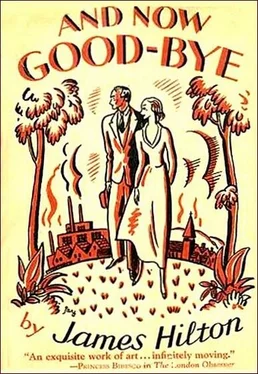“Well, well, I suppose if you feel like that about it—”
I do feel like that, and my wife would say the same. If thine eye offend thee, pluck it out, so the Good Book says.”
“It also, I believe, mentions forgiveness—”
“It says we should forgive our enemies, not our daughters.”
Which set Howat reflecting absently that it was, most certainly, much easier to forgive one’s enemies than one’s friends and relatives—could it be, then, that the more difficult achievement was not seriously expected of us? Garland, however, had clearly not meant so much, and Howat answered, with sudden distaste for the entire argument: “Anyhow, Mr. Garland, there doesn’t seem much point in discussing all this till we definitely hear where the girl is and what she’s doing. I wish—I do wish sincerely—that I could help you in some way—I assure you I sympathise most deeply—”
“I don’t see what anybody can do. Personally, I don’t expect ever to hear from her again—if she’s decided to live that sort of life, she’ll know that we won’t have anything more to do with her. We don’t even want to hear her name mentioned. Henceforward—”
Garland continued in this strain for several minutes longer, and Howat, at the first considerable pause, was glad to make his excuses and get away.
The second post usually arrived at the Manse towards noon, and was placed on the study table to await Howat’s return from his morning’s visits. That Wednesday morning, when he reached home, there was quite a collection for him to deal with—bills, circulars, appeals—the usual mixture, and then, between two larger envelopes, a small one, addressed in a writing which he faintly recognised, though he could not quite decide where he had seen it before. He opened the envelope and read, from a single sheet of plain paper without any address heading:
“Dear Mr. Freemantle,—You will be surprised to hear from me, I am sure, but I am presuming on our slight acquaintance to ask a favour. No doubt by this time you and everyone else in Browdley must know that I have left home, and though I do not regret doing so, I do not want my parents to worry about me unnecessarily. I wish you could assure them that I am perfectly all right and quite happy. I hate leaving as I had to do, but I really do feel that I am too old to be treated as a child. Do you think you could possibly explain that to them? I know it is asking a great deal, but I cannot think of anyone else who could do it. I must thank you, too, for the German lessons which I am sure will prove of use to rue, and I enclose two pounds which I think I owe you for them. I have no permanent address just at present, but for the next few clays anything addressed c/o the Charing Cross post office would reach me. With kindest regards and many thanks,
Yours sincerely, Elizabeth Garland.”
Howat stared at the letter with a sharp sensation of dismay. This Garland affair seemed to get more and more complicated and to be dragging him, against his will, nearer and nearer to the centre of it. He had always been careful to avoid any sort of private friendship with the younger girls of his chapel—he thought it undesirable for a good many reasons—yet here he was, the confidant, whether he chose to be or not, of a girl who had run away from home and was eloping (to use the politest word) to Paris. It was all rather unfortunate, and he did not quite know what would be the best course to take. If he showed the letter or conveyed the message to Garland, he could imagine the fellow’s conclusions. Nor, despite the girl’s optimism, did he feel at all equal to explaining to Garland that his daughter was ’too old to be treated as a child’. Really, it was a most difficult situation and he went into dinner feeling sadly perplexed. Almost as soon as he sat down, his wife said: “I suppose you didn’t call on the Garlands, Howat? Don’t you think you ought to—to express our sympathy?”
He answered: “I met Garland in the street outside his shop and we went in for a little talk. I told him how sorry we were.”
“Did he tell you that the person the girl’s run off with is a man over fifty—married and with a family?”
“Good heavens, no? Wherever did you hear that?”
Mrs. Freemantle smiled in a satisfied way and exchanged a glance with Aunt Viney; it was so rarely that she could rouse her husband’s interest, much less a touch of excitement, in any titbit of local gossip. “Viney heard it from a woman in the baker’s shop this morning. It’s true, because the woman’s son has a job at the same cinema—he’s a ticket attendant or something.”
“I—I don’t know. It sounds so—so incredible. A man of that age and a girl of—how old would she be—nineteen—twenty or so—I suppose?”
“She’s twenty-two.”
Howat did not answer for a time, and at last he merely remarked, as if to himself: “Oh, then she has a legal right to do as she likes. I didn’t quite realise that. But still…” He checked himself, feeling he had already discussed the matter at far too great a length. “It’s all most unfortunate,” he ended up, “and I do think that the less people talk and spread gossip about it, the better.”
Wednesday afternoon was the time for the weekly meeting of his Ladies’ Working Party and Sewing Guild, and it was his custom to look in about three o’clock, and take an unwanted cup of tea in a schoolroom that always smelt rather depressingly of old clothes. He did not much care for the job, but it was expected of him; the women liked the few minutes of social contact with the minister; it gave them food for gossip afterwards whether he looked well or ill, whether his clothes were shabby, whether he got on all right with his wife, if it were true that his son in Canada had entirely gone to the bad and never wrote home, and so on.
Howat read in his study till three o’clock that afternoon; then he walked over to the schoolroom. The women greeted him with their usual fussy murmurs of appreciation, but it was noticed immediately by the more observant of them that he did not seem altogether himself’—he did not make those customary jovial remarks about the garments they were working at, those time-honoured witticisms which never failed to produce attacks of coyly restrained giggling. On the contrary, he seemed preoccupied, his smiles went over their heads as if directed at another world, and he went on stirring his tea in an absent-minded way long after the two lumps of sugar were most certainly dissolved.
And at a quarter-past three, which was rather earlier than his habit, he bade adieu to the ladies and went out into the glooming streets. He felt he wanted a walk, and left the town by the main road, turning into muddy fields as soon as he could. He walked briskly for a mile or so, and then leaning against a stile, re-read the letter in his pocket amidst the falling twilight. A puzzle, really, to know what to do. She had appealed to him, and despite the impossibility of what she asked, he rather liked the style of the letter—simple, straightforward, neither explaining nor apologising, but merely asking. And no mention of the man in the case. That, he thought, showed a certain delicacy. But a married man with a family…really, how could such a thing be possible?
Howat, in fact, was bewildered; for, despite his years, he knew little about the world of private scandal—certainly less than did an average girl at a boarding-school, He never read the News of the World , and never went to the cinema; throughout his adult life, even during the War, he had preserved an ignorance, perhaps even an innocence, that was largely compounded of distaste and lack of interest. Divorces, liaisons, crimes passionels , and all the rest of the Sunday diet of many a quite respectable family, affected him with a slightly disgusted incredulity which he found hard to conceal; fortunately, however, such things belonged mainly to a world with which Browdley had little in common.
Читать дальше











